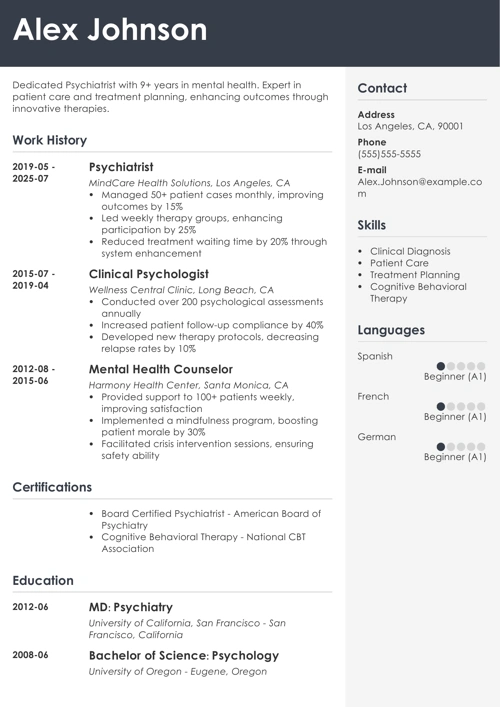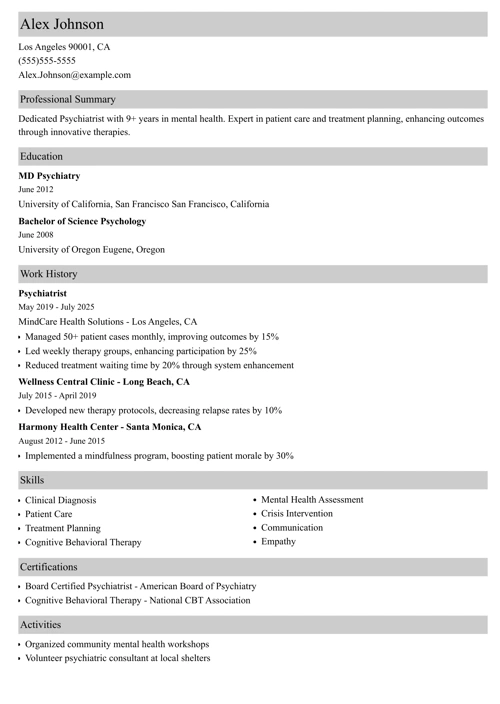Stepping into the field of psychiatry means you need a resume that not only highlights your proficiency in mental health care but also captivates potential employers. This article offers expert advice and psychiatrist resume examples to help you create a standout application.
This guide will show you:
- A psychiatrist's resume example that stands out from the crowd.
- How to craft a psychiatrist resume that increases your interview opportunities.
- Tips and illustrations on showcasing skills and achievements in a psychiatrist resume.
- Ways to effectively detail your experience on a psychiatrist resume to secure any desired position.
Want to save time and have your resume ready in 5 minutes? Try our resume builder. It’s fast and easy to use. Plus, you’ll get ready-made content to add with one click. See 20+ resume templates and create your resume here.
Sample resume made with our builder—See more resume examples here.
If you're eager to explore more resume samples, here’s your destination:
- Psychology Resume Examples & Guide
- School Psychologist Resume: Examples & Guide
- Therapist Resume: Examples, Templates & Guide
- Mental Health Counselor Resume Examples & Guide
- Social Work Resume Examples & Guide
- School Counselor Resume Examples & Guide
- Academic Advisor Resume Examples & Guide
- Professional Resume Examples for All Jobs
Psychiatrist Resume Example
Dr. Alex Johnson
Psychiatrist
Phone no. 987-654-3210
alex.johnson@email.com
linkedin.com/in/alexjohnsonpsychiatrist
Summary
Compassionate and dedicated Psychiatrist with over 9 years of experience in mental health care. Eager to support Mindful Health Clinic in enhancing patient care through evidence-based therapeutic practices and personalized treatment plans. Recognized for reducing patient relapse rates by 30% through innovative therapy programs.
Experience
Senior Psychiatrist
Wellness Mental Health Center, New York, NY
January 2015–December 2024
Key Qualifications & Responsibilities
- Conduct comprehensive psychiatric evaluations and develop individualized treatment plans.
- Collaborate with multidisciplinary teams to ensure holistic patient care.
- Lead weekly therapy sessions for individuals and groups.
- Provide crisis intervention and emergency psychiatric services.
Key Achievement:
- Developed a mindfulness-based therapy program that improved patient outcomes by 25%.
Education
Doctor of Medicine in Psychiatry
Harvard Medical School, Boston, MA
August 2005–May 2009
Relevant extracurricular activities
- Member of the Psychiatry Interest Group
- Volunteer at the Mental Health Awareness Campaign
Academic achievements
- Graduated with Honors
- Recipient of the Excellence in Psychiatry Award
Skills
- Patient Assessment
- Cognitive Behavioral Therapy (CBT)
- Crisis Management
- Psychopharmacology
- Team Collaboration
- Patient Advocacy
- Research and Analysis
- Communication
Certifications
- Board Certified Psychiatrist, American Board of Psychiatry and Neurology, 2010
- Certified in Cognitive Behavioral Therapy, Beck Institute, 2012
Awards
- 2020, Outstanding Psychiatrist Award, American Psychiatric Association
Memberships
Member of the American Psychiatric Association since 2010
- Contributed to the development of the APA's new guidelines on anxiety disorders
- Presented research on the impact of digital therapy tools at the 2022 APA Annual Meeting
Languages
- English—Native
- Spanish—Fluent
Interests
- Conducting workshops on mental health awareness and resilience building
- Writing articles on mental health topics for a personal blog with over 5,000 followers
Here’s how to write your own psychiatrist resume:
1. Format Your Psychiatrist Resume Correctly
Your psychiatrist resume must tackle a unique challenge: standing out in a sea of applications. To grab the hiring team's attention, your resume should be visually appealing and professionally formatted. A well-crafted resume format can significantly increase your chances of making a strong impression.
To format your resume for psychiatry roles:
- Begin with a resume header. Include your name, phone number, email, LinkedIn profile, and an online portfolio link. These are crucial contact details on a resume.
- You may omit your street address but include your town if it matches the company’s location.
- Opt for a reverse-chronological resume. This format is favored because it lists your most recent job first, aligning with the standard resume layout expected by hiring managers.
- Select a professional font such as Calibri or Arial, with a font size for resumes between 10 to 12 points.
- Save your resume file as “Your Name - Psychiatrist - Resume.pdf.” A PDF file is preferable over MS Word since it maintains the format integrity.
- The perfect resume length for entry-level psychiatrists is one page. However, if you have extensive experience, a two-page resume may be appropriate.
Ensure your resume looks professional with the correct margins: Guide to Resume Margins
2. Customize Your Psychiatrist Job Description
It's crucial to understand the importance of tailoring your resume for each job application. Generic work experience sections often fail to impress. When hiring managers see a generic list of responsibilities, they may wonder about your actual impact and effectiveness in your previous roles.
To effectively integrate relevant experience into your resume:
- Match your job title with the one mentioned in the job listing. Applicant Tracking Systems (ATS) often favor exact matches of job position titles.
- List the company name and your employment dates, followed by 3–6 bullet points for each role, emphasizing more recent positions.
- Illustrate how you applied key skills with specific achievements, ideally using metrics and key performance indicators (KPIs) to highlight your notable accomplishments.
- Initiate each bullet point with strong action verbs such as led, enhanced, or facilitated.
Psychiatrist Resume Examples: Responsibilities
- Conduct comprehensive mental health evaluations and create individualized treatment plans for patients.
- Collaborate with a multidisciplinary team to ensure cohesive patient care and treatment outcomes.
- Administer and adjust psychopharmacological treatments based on patient response and clinical guidelines.
- Provide psychotherapy and counseling to individuals and groups, addressing a range of psychiatric disorders.
- Document patient progress and treatment outcomes, maintaining accurate and up-to-date medical records.
- Educate patients and their families about mental health conditions, treatment options, and wellness strategies.
- Participate in continuous professional development to stay current with advancements in psychiatry.
Remember to use action verbs that convey your responsibilities and achievements effectively. Here are some action verbs for psychiatrist resumes:
Psychiatrist Resume Examples: Action Verbs
- Diagnosed
- Collaborated
- Prescribed
- Evaluated
- Counseled
- Documented
- Educated
- Assessed
- Implemented
- Monitored
Express your strengths with the right words: Resume Synonyms: Strong
3. Make Your Education Section Count
Including your educational qualifications on a resume is standard practice. However, just listing your degree title, university name, and dates can be a missed opportunity. It's like using a powerful tool for a simple task. Highlighting how your education has contributed to your skills can elevate your chances of landing interviews.
Consider these resume enhancement tips:
- The optimal placement for your degree is following your work experience section.
- For those crafting an entry-level resume, showcasing pertinent coursework can underscore your competencies.
- Even in an experienced candidate’s resume, you can incorporate bullet points to spotlight fellowships, scholarships, or leadership roles held.
- Is it advisable to include your GPA on a resume? If it's exceptionally high, then certainly.
Add a touch of prestige to your resume with these tips for listing cum laude honors: Cum Laude on Resume
Creating a resume with our builder is incredibly simple. Follow our step-by-step guide and use content from Certified Professional Resume Writers to have a resume ready in minutes.
When you’re done, Zety’s resume builder will score your resume and our resume checker will tell you exactly how to make it better.
4. Prove the Psychiatrist Resume the Company Wants
Your resume should be a reflection of the professional skills the employer is looking for, but it's not just about listing them. You might already have a list of 5–10 psychiatrist skills in mind, but choosing them at random could leave you overlooked. Instead, focus on the skills emphasized in the job advertisement.
Here's how to seamlessly incorporate psychiatrist skills into your resume:
- The skills mentioned in the job ad serve as resume keywords. Ensure these keywords are included in your skills section.
- Avoid overwhelming your resume with an excessive number of skills. Stick to the essentials to keep the desired skills prominent.
- To boost your chances of getting more interviews, integrate these skills into the descriptions of your professional and educational experiences.
Check out these hard and soft skills that are highly valued in psychiatry:
Psychiatrist Resume Skills
- Patient Assessment
- Treatment Planning
- Clinical Research
- Diagnostic Expertise
- Crisis Intervention
- Medication Management
- Therapy Techniques
- Psychotherapy
- Empathy And Compassion
- Interpersonal Skills
- Verbal And Written Communication Skills
- Leadership Skills
- Organizational Skills
- Active Listening
- Problem-Solving Skills
- Time Management Skills
- Attention To Detail
- Stress Management
- Teamwork Skills
- Computer Skills
- Adaptability
5. Add Other Sections to Your Psychiatrist Resume
While your resume might be impressive, it’s crucial to show hiring managers what working with you would be like. Are you that proactive employee who leads and accomplishes tasks efficiently? Incorporate additional sections to emphasize your strengths and capabilities for psychiatry roles.
Consider including these supplementary sections to highlight your strengths:
- List any pertinent certifications you've earned, such as a board certification in psychiatry.
- If you’ve contributed articles to medical journals, include them. Publications on a resume reflect your expertise and authority in the field.
- Membership in professional organizations like the American Psychiatric Association can demonstrate your engagement in the industry.
- Volunteering in mental health initiatives can be noteworthy. Learn where to put volunteer work on a resume to best showcase relevant skills.
- If you’re proficient in additional languages, this could be advantageous, too.
Master the art of self-presentation with our guide on introducing yourself professionally: How to Introduce Yourself
6. Write a Psychiatrist Resume Objective or Resume Summary
Catching the eye of hiring managers within their limited review time is crucial. With a concise resume introduction, you can encapsulate your key strengths and make a lasting impression.
Think of this as your resume profile, a quick yet powerful elevator pitch of your professional persona. Unlike a traditional pitch that lasts 30 seconds, aim to convey your value in a succinct paragraph.
For those with over a year of experience, include your job title, the impact you intend to make at the company, and a few noteworthy achievements. This format is known as a resume summary, and it should be prominently placed at the top.
If you're pondering how to write a resume with no experience, focus on accomplishments from your academic pursuits or projects. These initial statements are termed objectives for a resume.
Uncover the secrets to crafting a standout resume with a compelling Summary of Qualifications that catches recruiters' eyes.
7. Write a Cover Letter for Your Psychiatrist Resume
Crafting a cover letter is essential to distinguish yourself from other applicants. While many candidates send out a flood of resumes, a tailored cover letter can demonstrate your genuine interest in a particular role and company.
Create your resume cover sheet like this:
- Use a professional cover letter structure: with the same header as your resume and a business-ready signoff at the end.
- How to format cover letter: 3–5 paragraphs and less than a full page.
- How to begin a cover letter: job title in the first sentence and an icebreaker that makes them continue reading.
- Middle paragraphs: the biggest few psychiatrist achievements in your resume.
- How to end it: write a cover letter conclusion that adds a few more skills and requests a conversation to discuss how you can help them.
- Finally, write an application follow-up email weekly for a month. Make it super-short and attach your resume and cover letter PDFs.
Master the art of spacing to make your cover letter easy to read and professional: Cover Letter Spacing
Plus, a great cover letter that matches your resume will give you an advantage over other candidates. You can write it in our cover letter builder here. Here's what it may look like:
See more cover letter templates and start writing.
Every job application is an opportunity to showcase your unique skills and experiences. Believe in your potential, and let your resume reflect that confidence. Thank you for reading!
About Zety’s Editorial Process
This article has been reviewed by our editorial team to make sure it follows Zety's editorial guidelines. We’re committed to sharing our expertise and giving you trustworthy career advice tailored to your needs. High-quality content is what brings over 40 million readers to our site every year. But we don't stop there. Our team conducts original research to understand the job market better, and we pride ourselves on being quoted by top universities and prime media outlets from around the world.





